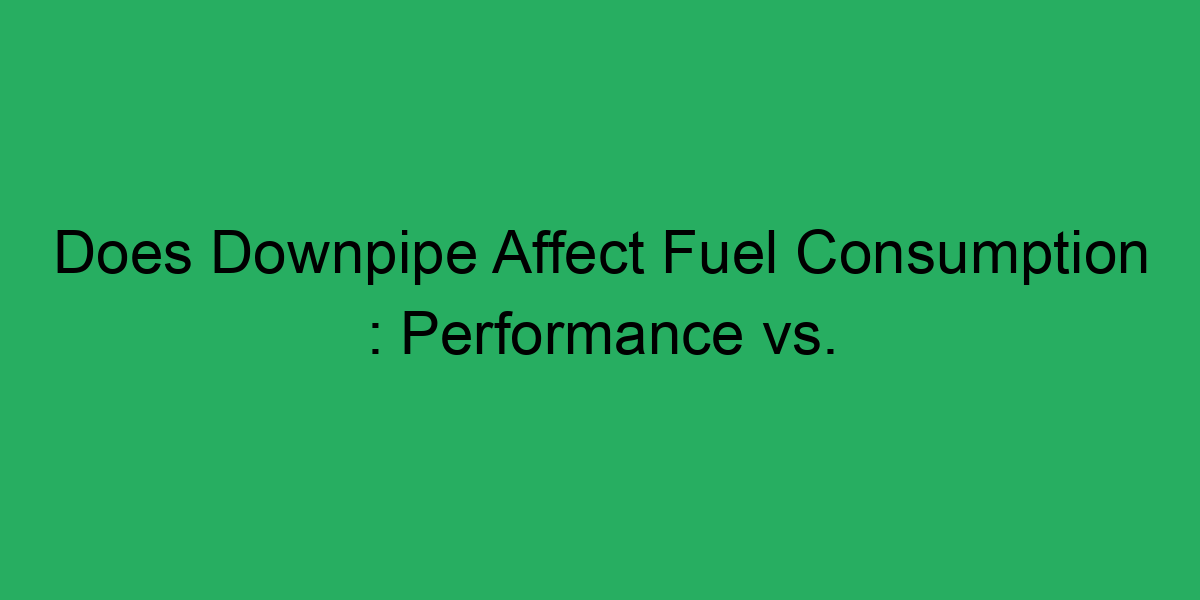Did you know that installing a downpipe on your vehicle can significantly alter your driving experience, but what about its impact on fuel consumption? Here’s a surprising question: Could a downpipe, designed to enhance performance, actually improve your gas mileage? In this article, we’ll delve into the relationship between downpipes and fuel consumption, exploring the key factors and real-world examples that will help you make an informed decision.
Contents
Key Takeaways
- Driving Habits Matter: The impact of a downpipe on fuel consumption largely depends on how you drive your vehicle.
- Engine Efficiency: Reducing exhaust restriction can theoretically improve engine efficiency, potentially leading to better gas mileage.
- Performance Tunes: When combined with performance tunes, the increased power can offset any efficiency gains, leading to higher fuel consumption.
- Catted vs. Catless: The choice between a catted and catless downpipe can influence fuel consumption, but the difference is often minimal.
- Real-World Variability: Actual fuel consumption changes can vary widely based on individual driving conditions and vehicle modifications.
Understanding Downpipes and Fuel Consumption
A downpipe is a critical component of a vehicle’s exhaust system, connecting the turbocharger or catalytic converter to the rest of the exhaust. When you install a high-performance downpipe, especially a catless one, it reduces backpressure and allows the engine to breathe more freely.
Theoretical Benefits
Theoretically, reducing exhaust restriction should improve engine efficiency. With less backpressure, the engine has to work less hard, which could lead to better gas mileage, especially during cruising or low-throttle driving.
Real-World Impact
However, the real-world impact is often more complex. Many drivers find that the increased performance and power from a downpipe and accompanying tune lead to heavier footed driving, which can negate any potential fuel efficiency gains. For instance, a driver with a BMW 340i noted that while the difference in MPG was minimal, the temptation to drive more aggressively was significant.
The Role of Performance Tunes
Performance tunes that accompany downpipe installations often increase power output by adjusting fuel injection and boost levels. While these tunes can enhance performance, they typically require more fuel to produce the additional power. This means that even if the downpipe itself improves efficiency, the tune could offset these gains, leading to higher overall fuel consumption.
Catted vs. Catless Downpipes
The choice between a catted and catless downpipe also plays a role. Catless downpipes remove the catalytic converter, further reducing backpressure but potentially increasing emissions. In terms of fuel consumption, the difference between catted and catless downpipes is often minimal, but it can vary depending on driving habits and other modifications.
Examples and Applications
Case Study 1: BMW 340i
A driver with a 2016 BMW 340i installed a catless downpipe along with a performance tune. While the driver reported minimal changes in MPG under normal driving conditions, the increased power led to more aggressive driving, which occasionally resulted in lower mileage. This example highlights how driving habits can significantly influence the impact of a downpipe on fuel consumption.
Case Study 2: Subaru Impreza
A Subaru Impreza owner installed a catted downpipe and noted that, theoretically, the reduced backpressure should improve MPG. However, the owner also mentioned that the desire to test the new performance often led to heavier footed driving, which could offset any efficiency gains. This case underscores the importance of consistent driving habits in assessing the true impact on fuel consumption.
Conclusion
In conclusion, the effect of a downpipe on fuel consumption is multifaceted and largely dependent on your driving habits and the accompanying modifications to your vehicle. While a downpipe can theoretically improve engine efficiency, the increased power and temptation to drive more aggressively often balance out these gains. By understanding these dynamics, you can make informed decisions about your vehicle modifications and driving style to optimize both performance and fuel efficiency. So, the next time you consider upgrading your exhaust system, remember that the real impact on your gas mileage might just be in your hands.

Hi, I’m Sufiyan, the developer behind this platform. I created FuelConsumptionCalculator.com to simplify fuel tracking for everyone — because understanding your vehicle shouldn’t require a degree in mechanics. I’m always working on adding more tools and content to make this site even more useful

